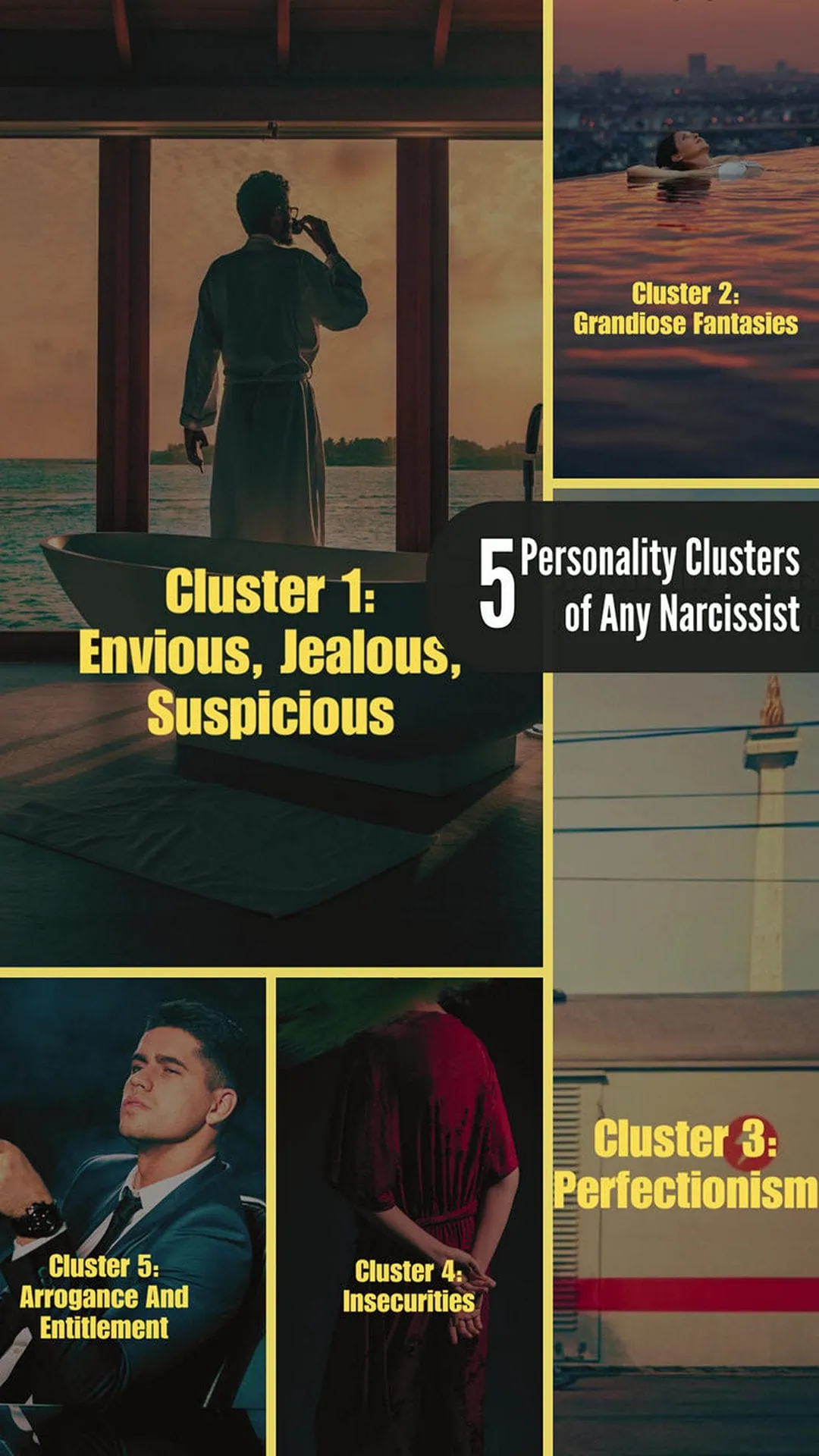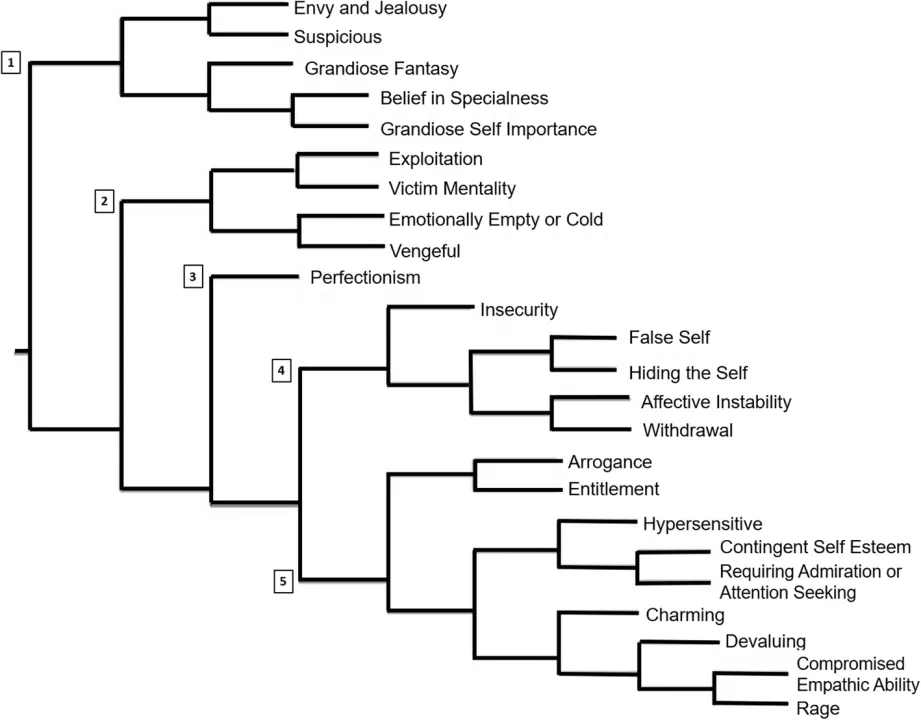Today's Friday • 8 mins read
— Reviewed by Dr. Sandip Roy.
You may know someone who always seems to bury your points to prove their superiority.
Worse, they want you to thank and admire them for pointing out “how wrong you were.”
These could be signs of narcissism. But that desire to be deemed superior to others is not the only thing that makes a narcissist.
To spot a narcissist, you have to look for features from the five key trait clusters. These five clusters form an umbrella covering all the features and behaviors of narcissism.
Cluster 1: Envious, Jealous, Suspicious
The Green-Eyed Monster and Distrust
- Envy and Jealousy: People with narcissistic traits often feel envious of others. They also believe that others are envious of them. We must note that narcissistic behavior can fluctuate over time. So, their envy and jealousy can oscillate between overt expressions and more subtle, internalized feelings.
- Toxic Impact: Narcissistic envy is not just about wanting what others have; it can lead to deep-seated resentment and a desire to bring others down. This craving to put others down to feel superior can create a toxic environment around them.
- Origin of Envy: There is a known relationship between trauma and narcissism, with narcissistic symptoms sometimes originating from emotionally abusive or manipulative environments (Ronningstam, 2010). This background can fuel intense envy and jealousy as a defense mechanism.
- Suspicious Nature: They feel insecure because of constantly comparing what they have with what others have. They fear that people will rob them of what they own. Suspicious, they always question other people’s intentions and motives. The result is that they become distrustful of people, even their closest ones.

By the way, there is a difference between jealousy and envy; here’s a short table:
| Feature | Envy | Jealousy |
|---|---|---|
| Focus | Desire for what others have | Fear of losing what one has |
| Emotion | Resentment, longing | Insecurity, distrust |
| Behavior | Wishing to possess others’ possessions or qualities | Protectiveness over someone or something, over-possessiveness |
| Trigger | Others’ success or good fortune | A perceived threat of losing someone or something |
Cluster 2: Grandiose Fantasies
Living in a Fantasy World
- Belief in Specialness: Narcissistic people believe inside they are unique and can only be understood by other special people. They believe they are special and deserve more attention than others.
- Grandiose Self-Importance: They have an inflated sense of their own importance and achievements. Grandiosity in narcissists is a defense against deep-seated feelings of vulnerability. When this defense fails, it can trigger intense insecurity and self-doubt.
- Exploitation: They tend to take advantage of others to achieve their own ends. They justify their self-centered exploitative acts as a survival mechanism. They tend to believe, “The world doesn’t give you anything; you have to seize it.”
- Victim Mentality: Despite their grandiosity, they often feel like victims, portraying and believing that they are misunderstood or wronged by others. Exploitation and victim mentality are common in grandiose narcissists. This comes from a mix of self-importance, entitlement, lack of empathy, and not getting everything they want.
- Manipulative Tactics: They can manipulate and exploit anyone without feeling guilty. While they gain from this, they simultaneously show themselves as victims to garner sympathy and deflect blame.
- Emotionally Empty or Cold: They are often emotionally detached, lacking the depth or warmth of feelings. They come aloof in conversations.
- Spiritual Bypassing: Some narcissists use religious or spiritual beliefs to build up their sense of control and esteem. This can manifest as exploiting others under the guise of religious authority or martyrdom. Many cult leaders are narcissists.
- Vengeful: They quickly become vindictive and seek revenge if they feel slighted. This is especially dangerous in a malignant narcissist — the most evil type of narcissist.
Psychologist Dr. Craig Malkin once said,
“Narcissism is about self-enhancement; it’s the perpetual quest to feel special.”
Cluster 3: Perfectionism
The Quest for Perfection
- Narcissistic Perfectionism: Perfectionism is another hallmark of narcissism. They want to be seen as perfect at whatever they do. But there’s a twist — they are less self-critical but more oriented toward criticizing others. So they set unrealistic standards for those around them while maintaining an illusion of personal infallibility.
- Unattainable Standards: Their drive for perfection in others is not just about having high standards; it’s about setting unattainable goals. This lets them maintain a sense of superiority and control over others. Of course, when people fail to reach the narcissist’s unrealistic standards, narcissists criticize them. This can make others fall into chronic dissatisfaction, constantly striving for impossible goals.
- Origin of Narcissistic Perfectionism: Narcissist’s perfectionism often stems from environments where people abuse them emotionally or manipulate them. This reinforces their need to control and perfect their surroundings to protect their fragile self-image.
- Frustration: Over time, their perfectionism streak can lead to constant frustration. As they age, they gather an underlying dissatisfaction with their lot in life.
Cluster 4: Insecurities
Hiding Behind A Mask of Confidence
- Hiding the Self: Despite their outward arrogance, many narcissists are deeply insecure. So they hide their negative parts, vulnerabilities, and true feelings from others.
- False Self: They create a “false self” — a persona that projects an image of infallibility. This false reality of a confident exterior can be exhausting to maintain.
- Affective Instability: They go through intense emotions and unstable moods. This makes it hard for them to maintain stable relationships.
- Withdrawal: At times, they might withdraw from social interactions to protect themselves from perceived threats.

Cluster 5: Arrogance and Entitlement
The King (or Queen) of the World
- Arrogance: They are arrogant, especially the grandiose narcissists. It is their very nature to exude a sense of superiority. They will be condescending and rude towards others at the first opportunity.
- Entitlement: “Entitlement” is a belief that a person deserves special treatment or recognition. Narcissists have this built-in idea that they must be treated as special people, without actually being worthy of it. And when others do not meet their high expectations, they can quickly take offense and sulk.
- Hypersensitive: Despite their outward arrogance, they are extremely sensitive to criticism. Feedback is not something they can handle with grace.
- Fragile Ego: They crave constant admiration. You’ll notice they fish for compliments and need people to praise them all the time. This need for constant validation and admiration is to safeguard their fragile self-esteem. They are also extremely sensitive to criticism due to their fragile self-esteem. When they perceive a slight to their ego (even when there is no real slight), they often get volatile and react unpredictably.
- Contingent Self-Esteem: Their self-esteem is dependent on external validation. They often suffer from low self-worth and poor self-esteem.
- Requiring Admiration and Attention: They constantly seek praise and attention from others. This makes them feel good and noticed, especially for their looks and wear.
- Charming: They can be very charismatic and charming to pick up praise or favors from others. They can quickly find out what a person likes and can effortlessly slide into that topic. However, this charm does not seem to persist beyond the initial stages of a relationship or under specific circumstances (e.g., in public with an audience).
- Devaluing: They tend to belittle and devalue others to maintain their sense of superiority. It is natural for them to judge other people’s good gestures and achievements as sub-par.
- Reduced Empathic Ability: They lack emotional empathy and fail to understand, respond, or care about others’ emotions. They can discard you after using you, without feeling guilt or remorse. Even when they seem empathetic, it is mostly a charade — they are not actually moved.
- Rage: They are quick to anger or rage when they feel threatened, criticized, or opposed. The fallout of narcissistic rage can be extremely jarring and scarring.

A Narcissist’s Language
Can you tell a narcissist from their language? This study suggests yes, you can.
People with high narcissism:
- use more words overall,
- more swear words (e.g., damn),
- frequently use auxiliary verbs (e.g., will),
- show less agreement in their speech,
- use more aggressive and disagreeable words, which leads to poorer quality relationships with others.
Final Words
Remembering these five clusters of narcissism can help you see the narc behind the mask.
Most narcissists are charming. If they are talking to a room full of strangers, each can come off as if they were talking to only him/her.
But their confidence often hides deep insecurities and a need for narcissistic supply. These show up ugly when they have trapped you into a relationship.
Narcissistic traits can be linked to attachment trauma and emotionally devaluing environments. They may really have been victims before they became narcissists.
“Narcissism is an illness that can be likened to an emotional cancer. It eats away at the person suffering from it and those around them.”
But still, it doesn’t give hurt people any right to hurt other people.
√ Also Read: Narcissistic Relationship Cycle – 4 Seasons of Torture
√ Please spread the word if you found this helpful.
• Our Story!
